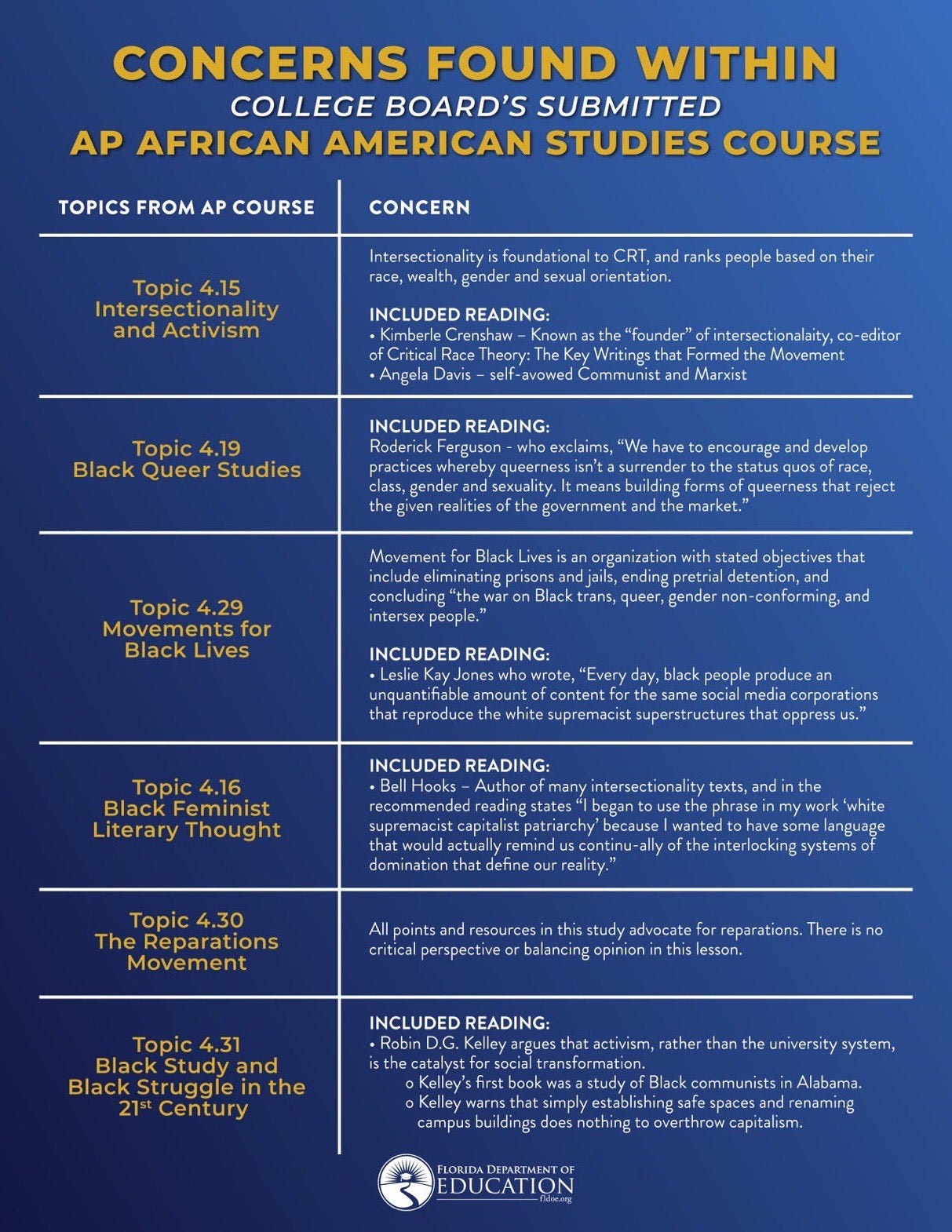Defending Desantis on His Black Studies “Ban”
African American history and African American Studies [APAAS] are not the same thing.
Anyone who has followed the headlines lately can be forgiven for thinking that Ron Desantis, Governor of Florida, is prohibiting the teaching of African American history in his state.
The messaging is clear. Here are some examples:
Rep. Jamal Bowman, a rising star among the Democrats, said:
Ron DeSantis, do me a favor, pick up a book and read a book. Read a couple of books. Read an African-American history curriculum [book] so that you can understand that the birth of European history started in the continent of Africa. And we know that you are trying to erase that history because you don’t want Black people to have knowledge of self. You want to keep us dumb, deaf, and blind, so that you can oppress, suppress, and control us.
Karine Jean-Pierre used her position as White House Press Secretary to say:
It is incomprehensible to see that this is what this ban–or this block, to be more specific–that DeSantis has put forward. If you think about the study of Black Americans, that is what he wants to block and, again, these types of actions aren’t new, especially from what we’re seeing from Florida, sadly.
And, an NY Times essay titled “Ron DeSantis Wants to Erase Black History. Why?” put forth that “Florida is at the forefront of a nationwide campaign to silence Black voices and erase the full and accurate history and contemporary experiences of Black people.”
If those stories were too subtle, there's always Twitter:

Such indictments against a sitting governor — one who might possibly be our next president — are sensational. They are also inaccurate. African American history has been and continues to be taught in Florida.
Indeed, Florida schools are required to do so by statute. Title XLVII (“EARLY LEARNING-20 EDUCATION CODE”), Chapter 1003, of the 2022 Florida statutes states this clearly:
“The history of African Americans, including the history of African peoples before the political conflicts that led to the development of slavery, the passage to America, the enslavement experience, abolition, and the history and contributions of Americans of the African diaspora to society” is “required instruction.”
How Governor DeSantis is being accused of banning the teaching of African American history in Florida when schools there are required to teach it is easy to explain -- African American history and African American Studies [APAAS] are not the same thing.
The objective of an African American history course is, as the name states, to teach the rich and powerful history of African Americans in the United States, from the slave trade to abolition to the civil rights movement to today, as well as the contributions African Americans made and continue to make to this country. African American history is interwoven throughout all aspects of American history.
In fact, AACONS recently interviewed law professor Josh Blackman on his book An Introduction To Constitutional Law where we discussed such important Supreme Court decisions like Dred Scott v Sandford, Loving v Virginia, and Brown v. Board of Education. I encourage anyone interested in African American history to watch that interview:
African American Studies is defined by the APAAS curriculum outline as an examination of “the development of ideas about Africa’s history and the continent’s ongoing relationship to communities of the African diaspora,” but it is in fact a gateway to Marxism.
The Florida case is a perfect example. Below is a chart of the “concerns” that state had about its APAAS course. As the chart indicates, APAAS is, in essence, a combination of history with intersectionality, queer studies, the Black Lives Matters movement, feminism, and reparations.
Studying Harriet Tubman or the birth of jazz is not good enough for an APAAS course, apparently.
Particularly telling was the focus on Robin D.G. Kelly, a confessed Marxist professor who claimed in the NY Times that “the police are killing us [African Americans] with impunity.”
Stanley Kurtz wrote in the National Review:
Kelley warns that simply establishing safe spaces and renaming campus buildings does nothing to overthrow capitalism. Authentic black studies, argues Kelley, can be perfected only through revolutionary study and activism outside of the academy. In Kelley’s view, norms of objectivity that dominate the mainstream academy must be rejected in favor of Marx’s call for “a ruthless criticism of everything existing” — followed by fearless struggle against the powers thus exposed.
Professor Kelly was not the only leftist considered required reading before the course was rejected:
The expunged writers and scholars include Kimberlé W. Crenshaw, a law professor at Columbia, which touts her work as “foundational in critical race theory”; Roderick Ferguson, a Yale professor who has written about queer social movements; and Ta-Nehisi Coates, the author who has made the case for reparations for slavery. Gone, too, is bell hooks, the writer who shaped discussions about race, feminism and class.
It should be mentioned that there are many African American writers and scholars who were not expunged. These include Thomas Sowell, Clarence Thomas, Walter Williams, Glenn Loury, and Allen West. They were not expunged because they were never included. African American writers and scholars who do not push the progressive agenda were not considered worthy of being studied by those who organize APAAS courses.
Today, though, Florida’s APAAS curriculum begrudgingly allows the study of Black Conservatism as an optional topic for a research project. Thank goodness for small favors.
Again, African American Studies and African history courses are not the same, despite how often the two are conflated, and neither one is in danger of being banned in Florida. APAAS is thankfully being modified to make it less propagandistic.
APAAS can be a interesting study for college students, along with other courses in the same vein that focus on similar anti-capitalistic, anti-Western themes, such as women’s studies, Latino studies, environmental studies, and so on. If I was an academically-minded college student, I would consider taking these courses myself, although I imagine I would find the uncritical, one-sided presentation of such things like Critical Race Theory and intersectionality tedious at a certain point.
However, college-bound students in high school, sometimes before high school, are younger, less free to steer the direction of their education, and less exposed to alternative ideas. They are therefore more vulnerable to indoctrination. It is no wonder that Gen Z Americans are less conservative and more hostile to capitalism, less protective of the unborn, less heterosexual, and less protective of free speech, for example, than their older peers.
DeSantis’ efforts to protect Florida from the sort of Orwellian thought-control common in courses like APAAS is not an attempt to make Black Floridians ignorant of their history or to “whitewash history.” Nor is it enough. APAAS is so far limited to 60 schools but will expand to hundreds of schools beginning this year, and by 2025 is expected to be offered to every school nationwide.
Perhaps the solution is to have DeSantis’ policies go nationwide as well. Maybe after the next election.
—DK






